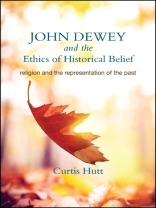Uses the thought of John Dewey to address the ethics of historical belief within religious and critical historiographical traditions.
John Dewey and the Ethics of Historical Belief addresses the ethics of the representation of the past with a focus on the justification of historical belief within religious and critical historiographical traditions. What makes a belief about the past justified? What makes one historical belief preferable to another? A great deal rides on how these questions are answered. History textbook wars take place across the globe, from California to India. Cultural heritage protection is politicized and historical research is commonly deployed in support of partisan agendas.
This book explores not only John Dewey’s relatively unknown contribution to this topic, but also the leading alternatives to his approach. Author Curtis Hutt focuses attention on the debate among those most influenced by Dewey’s thought, including Richard Rorty, Richard Bernstein, James Kloppenberg, Wayne Proudfoot, and Jeffrey Stout. He also reviews the seminal work of Van Harvey on the relationship between historians and religious believers. Dewey is cast as a vigorous opponent of those who argue that justified historical belief depends upon one’s religious tradition. Strongly resisted is the idea that historical belief can be justified simply on account of acculturation. Instead, Dewey’s view that beliefs are justified as a result of theorized historical inquiry is emphasized. In order to prevent moral blindness, the responsible historian and theologian alike are advised to attend to witnesses to the past that arise from outside of their own traditions.
Innehållsförteckning
Preface
Historical Introduction: Providing Reliable Witness to the Past: The New Troubled Relationship between Historians and Believers
Testes Veritatis: An Old Debate
Testes Veritatis: New Developments
The Ethics of Historical Belief: Religion and the Representation of the Past
1. The Ethics of Finding and Making the Past
Discovering the Past: The Epistemological Ethics of Scientific Historiography
Creating the Past: The Ethics of the Interpretation of the Past
Summary: Ranke and H. White
2. Dewey and the Ethics of Historical Belief
Dewey on the Justification of Historical Belief
Dewey’s Critique of Finding and Making the Past
Dewey’s Alternative Approach to the Ethics of Historical Belief
3. The Two Faces of Deweyan Pragmatism
Pragmatism without Method?
Richard Rorty on the Ethics of Historical Belief
Richard Bernstein on the Ethics of Historical Belief
Dewey on Interpretation and Inquiry
4. Justification, Entitlement, and Tradition: Debate After Dewey
From Van Harvey to the New Traditionalism
The Historian and the Believer: The Morality of Historical Knowledge and Christian Belief
Justification, Entitlement, and Tradition
5. Dewey and the Ethics of Historical Belief
Representing the Past
Notes
Bibliography
Index
Om författaren
Curtis Hutt is Visiting Assistant Professor of Religious Studies at the University of Nebraska at Omaha.












